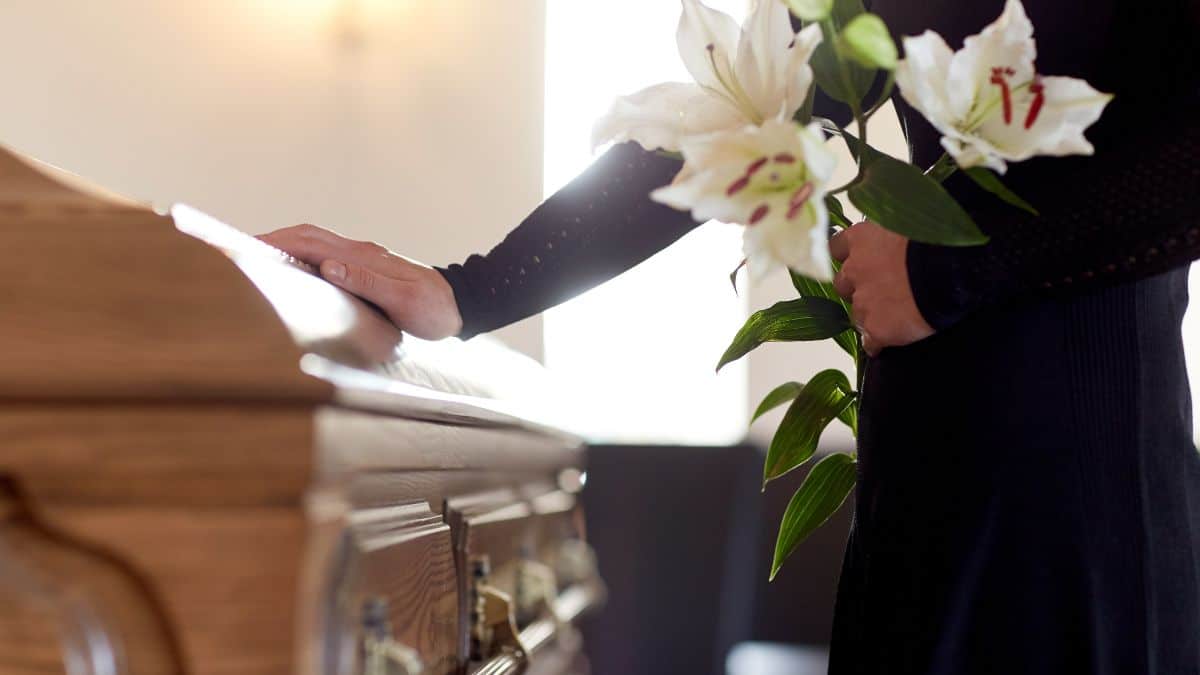When a loved one passes away, one of the first questions that arises is how long after someone dies is the funeral? Funeral arrangements and timing can vary depending on various factors such as religion, cultural traditions, and personal preferences. In this article you’ll learn about the average time between death and funeral, scheduling considerations for different religious funerals, body burial timeframes, and when funerals generally occur after death.
Funeral Timing
Average Time Between Death and Funeral
The average time between death and the funeral can vary depending on several factors. In most cases, the funeral service takes place within a week following the passing. However, this timeframe may be extended in certain situations, such as when the deceased needs to travel a long distance or when there are delays in obtaining the death certificate.
When funeral planning, it is important to consider the time needed for the funeral home to make arrangements and for loved ones to travel and attend the funeral. Funeral directors play a crucial role in guiding families through the funeral planning process and ensuring that all necessary arrangements are made.
Scheduling Considerations
Religious Considerations
Religious beliefs and customs often play a significant role in determining the timing of a funeral. Different religions have different guidelines and traditions regarding funeral services and burial.
Scheduling a Catholic Funeral
In the Catholic faith, funerals are often held within a few days after death. The deceased may undergo embalming to preserve the body and allow loved ones to pay their final respects. Catholic funerals typically include a funeral Mass, where family and friends come together to offer prayers and support.
Scheduling a Christian Funeral
Christian funerals may vary depending on the denomination and personal preferences of the deceased and their family. In some cases, the funeral may take place within a few days after death, while in others, it may be held at any time following the passing. Christian funerals often include a memorial or celebration of life service to honour the life of the deceased.
Scheduling a Jewish Funeral
In the Jewish faith, it is customary for the funeral to take place as soon as possible after death, preferably within 24 hours. This is done to honour the deceased and fulfil the religious requirement of prompt burial. Jewish funerals typically involve a simple ceremony led by a rabbi and the burial of the deceased.
Scheduling a Muslim Funeral
In the Muslim tradition, funeral and burial should ideally take place as soon as possible after death, preferably within 24 hours. The deceased is typically washed and wrapped in a white cloth, and prayers are offered at the gravesite. Muslim funerals are relatively simple and focus on honouring the deceased.
Scheduling a Hindu Funeral
Hindu funerals may vary depending on regional customs and traditions. In general, the funeral ceremony takes place within a few days after death, allowing family and friends to pay their respects and perform religious rituals. Hindu funerals often involve cremation, with the ashes being scattered in a sacred body of water.
Scheduling a Buddhist Funeral
Buddhist funerals often take place within a few days after death. The deceased may be laid in a casket or placed on a funeral pyre, depending on cultural practices. Buddhist funerals focus on prayers, chanting, and offering tribute to the deceased.
Other Factors to Consider
Aside from religious considerations, there are other factors that may influence the timing of a funeral. These include the availability of the funeral home, the need for extensive travel, and the preferences of the deceased or their family. It is important to communicate and coordinate with the funeral director to ensure that the funeral takes place at a time that suits everyone involved.
Planning and Arrangement
Funeral planning can be a complex process, especially during a time of grief and loss. It is essential to work closely with the funeral director to make all necessary arrangements, including choosing a suitable date and time for the funeral. The funeral home will guide the family through the process and help them make decisions regarding the type of service, the location, and any additional memorial events.
Funeral Trends in Recent Years
In recent years, there have been some changes in funeral trends that have impacted the timing of funerals. With the rise of cremation as a preferred choice, some families opt to hold a memorial service or celebration of life at a later date, allowing more time for loved ones to gather and reflect on the life of the deceased. This trend has created more flexibility in terms of when a funeral or memorial may take place.
Questions about Funeral Arrangements
If you have questions about funeral arrangements or need assistance with planning a funeral, it is advisable to reach out to a funeral home or funeral director. They have the expertise and experience to guide you through the process and ensure that your loved one’s farewell is conducted with care and respect.
Body Burial Timeframe
How Long Before a Body Must Be Buried
The time frame for body burial can vary depending on legal requirements and cultural practices. In many countries, including Australia, the deceased must be buried within a specified timeframe, typically within a few days to a week after death. This timeframe allows for proper preservation of the body and ensures that the funeral can take place in a timely manner.
Funeral Occurrence
When Funerals Generally Occur After Death
While there is no set rule or timeframe for when funerals should occur after death, they are typically held within a week following the passing. However, as discussed earlier, this timeframe may be influenced by various factors such as religious beliefs, cultural traditions, and logistical considerations. It is important to communicate with the funeral home and take into account the wishes of the deceased and their family when planning the funeral.
Final Thoughts
The timing of a funeral can vary depending on several factors, including religious beliefs, cultural practices, and personal preferences. Funeral arrangements should be made in coordination with the funeral home and take into account the needs and wishes of the deceased and their loved ones. While some religious funerals may occur within a few days of death, others may be held at any time following the passing. It is important to honour the deceased and provide a meaningful farewell that reflects their beliefs and values.
Do you need a funeral director in Geelong? Contact us today.
FAQ
How long after someone dies is the funeral?
The timing of a funeral can vary depending on a range of factors. Generally, funerals occur within a few days to a week after someone’s death, but this can differ due to various reasons such as religious requirements, the availability of the funeral home, and the family’s preferences. In some cases, if there is a need for an autopsy or if there are legal requirements, the funeral may be delayed further.
How does the decomposition process affect the timing of the funeral?
The decomposition process is a natural part of the body’s breakdown after death. In some cases, if the body is not refrigerated or embalmed, the decomposition process can progress relatively quickly, which may require a faster funeral arrangement. However, if the body is refrigerated or embalmed, it can slow down the decomposition process and provide more flexibility in the timing of the funeral.
Can I view the body before the funeral?
Yes, viewing the body before the funeral is a common practice. It allows family and friends to pay their respects and say goodbye to the deceased. Viewing can take place at a funeral home or sometimes at the deceased’s home, depending on cultural or religious customs. It is best to consult with the funeral home or your chosen funeral director to arrange a suitable viewing time.
Do funerals have to occur within a specific religious ceremony?
The type of religious ceremony associated with a funeral may vary depending on the individual’s beliefs or the family’s religious customs. Different religions have different traditions and rituals associated with funerals. For example, Roman Catholic funerals may include a requiem mass, while Orthodox funerals may combine prayers and customs specific to their faith. It is important to discuss your preferences for religious ceremonies with your chosen funeral director or clergy.
How can a funeral home assist in the funeral planning process?
Funeral homes are experienced in guiding families through the funeral planning process. They can provide assistance with arranging the funeral service, coordinating with clergy or celebrants, organizing transportation, and handling necessary paperwork. Funeral directors can also help with personalizing the funeral to honour the memory of the deceased, such as incorporating specific music, readings, or rituals.
Is it possible to have an open casket at the funeral?
Yes, it is possible to have an open casket at a funeral. Open casket funerals allow mourners to view the deceased, which can help in the grieving process and provide closure. Depending on the circumstances, such as the cause of death or condition of the body, the funeral director may advise against an open casket. Their guidance ensures that the body is presented in the most compassionate and dignified manner possible.
Can a funeral be delayed due to a significant date?
Sometimes, families may choose to delay a funeral to coincide with a significant date, such as a birthday or anniversary of the deceased. This is a personal preference and can be accommodated by the funeral home if it aligns with the family’s wishes. Discuss your preferred timing with your funeral director, and they can work with you to create a meaningful and timely funeral arrangement.
Is refrigeration required by law before a funeral?
Refrigeration is often recommended to slow down the decomposition process before a funeral. However, whether it is required by law may vary depending on the jurisdiction. Some regions have regulations that mandate refrigeration for a certain period, especially if the funeral cannot be promptly arranged. It is best to consult with your funeral director, as they will be aware of any specific requirements in your area.
Can the funeral home arrange an autopsy if needed?
Funeral homes generally do not directly arrange autopsies. Autopsies are typically organised by the medical examiner’s office or hospital. However, funeral homes often work closely with these entities to facilitate the transportation and transfer of the deceased’s body. If an autopsy is required, it is recommended to consult with the medical examiner’s office or hospital to understand the necessary procedures and timelines.
Does the funeral need to go above and beyond for COVID-19 precautions?
It is important to follow local regulations and guidelines regarding COVID-19 precautions during funerals. Funeral homes have adapted their services to comply with safety measures, such as limiting the number of attendees, implementing social distancing, and providing sanitization measures. They can tailor the funeral arrangements to prioritise the health and safety of everyone involved, while still dignifying the memory of the deceased.



